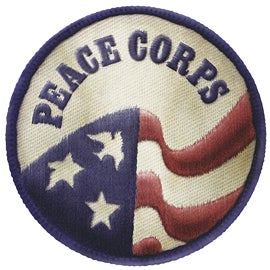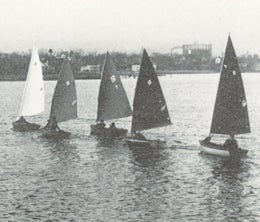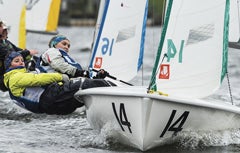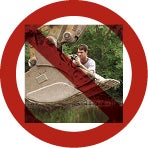Feedback
Wanted: Your Stories
Dear Reader,
We want to tell your tales—the things that happened to you, to your loved ones, to that neighbor nobody else remembers—and to do it, we need your help.

The University turns 125 next year, and we’re planning a celebration. Do you know of a now-lost student tradition? Did your grandfather sleep in a Quonset hut? Did your great-aunt commute to Newport daily by ferry? From student protests to life-changing professors to chicken plucking class, if you have URI-related historical photos, letters, memories or memorabilia, serious or irreverent, we’d be grateful if you’d share.
We’re also planning a story on the Peace Corps to celebrate the launch of a new Peace Corps Prep program at URI. Did you serve? What was it like? Would you do it again?
Email us about these ideas, or anything else that’s on your mind, at pjack@uri.edu. This is your alumni magazine, and we’d be honored to hear your thoughts, share your opinion, and tell your story.
Thanks for reading.
—Pippa Jack Editor in Chief
Write to us: pjack@uri.edu
Read more online:uri.edu/quadangles
Update your email address to get the magazine electronically: pjack@uri.edu
Sailing Down the Saugatucket

When I wasn’t struggling with calculus and German at URI, I somehow got involved with the sailing group. It operated out of a rented boathouse on the Saugatucket River—although calling the Saugatucket a river is a stretch. At best it is a muddy creek that meanders through Peace Dale and Wakefield.
From that boathouse to the upper reaches of Salt Pond was about half a mile, which we usually had to paddle down because the channel was so narrow and shallow. If we had to get out to move the boat off a shoal, we sank in black muck up to our knees. It was truly a Rube Goldberg arrangement, which led to discussions about getting a better location.
Lo and behold, the town of South Kingstown gladly leased a prime lot on Point Judith Pond to us. The late Lew Conklin ’50, our leader, found a sawmill in Hope Valley that readily unloaded green, third-grade lumber full of knotholes. We set about building our own boathouse (and filling knotholes). I remember Lew telling us to use a lot of nails, because the lumber would shrink and buckle. That building stood undamaged through several hurricanes.

Rachel Bryer and Hannah Scanlon on the way to a big win at the Dellenbaugh Trophy in March. The Lady Rams have qualified for the National Championships in San Diego in late May, and finished third in the New England Championships. Both have picked up individual distinctions: Bryer was runner-up for New England Intercollegiate Sailing Association (NEISA) Skipper of the Year award, and Scanlon was voted the number one NEISA Crew of the Year.
Our floating dock rested on empty 55-gallon oil drums. Some of them came from the dump, I believe.
When I became the University’s vice president for fundraising and public relations, I initiated a campaign to build a better boathouse. The committee consisted of Harry Anderson Jr., Hon. ’90, former commodore of the N.Y. Yacht Club; Ed Rumowicz ’57 of Hollywood, Florida; and the late Ralph Potter ’47, Hon. ’79, who had resurrected the program in the 1940s. They raised over $100,000.
Later Ed created a sizeable endowment that funds an annual lecture series. It brings maritime scholars to the campus and provides for an undergraduate seminar to foster a lifelong love of maritime literature.
An earlier gift from Harry Anderson made it possible to acquire a fleet of modern racing boats, replacing a fleet of wooden Dyer Dinks. He also contributed to Ed’s endowment, and recently donated $69,000 to help purchase 18 Collegiate FJ sailboats, which will arrive this August.
My time as a competitive URI sailor was limited, because I weighed in at 180 pounds. Skippers like lightweight crew members, but when there were near gales, I helped hold the boat upright. Eventually, I got to be a skipper thanks to the late Ian Harrington ’51, a classmate from Hawaii who taught me sailing fundamentals.
The journey down the Saugatucket has been rewarding. And now Rollin “Skip” Whyte ’72, URI sailing coach, has made the women’s sailing team number one in the nation.
—James W. Leslie ’52
Sarasota, Fla.
Puerto Rico Calling
The letter from Harry Perry Jeffries on the fast break (spring 2016) indeed broke the monotony of my evening hours at home in Puerto Rico. HPJ, as we called him, was my professor during my graduate school days in oceanography at beloved URI. He was instrumental in leading my way into the realm of marine science education. I lost track of him and it was wonderful to hear from this great professor.
I also loved the story “The Martians” (spring 2016). I am using the article to show everyone around here about progress in space ventures.
—Juan G. Gonzalez, Ph.D. ’73Professor Emeritus at the University of Puerto Rico, Mayaguez, PR
Bucket Truck No No
 As usual, I enjoyed reading the latest edition of QuadAngles, including “Turning Back Time” (spring 2016). I was, however, bothered by one of the photographs you chose to use. Excavation buckets should never be used as work platforms. Mr. Fox also does not seem to be wearing any kind of harness for fall prevention, nor a personal flotation device should he fall into the water. He should not have been in the bucket, the excavator operator should have refused his request, whoever took the photo of him in the bucket should not have let it happen, and you should not have used the photo, unless in the context of showing what not to do. Please be more safety-conscious.
As usual, I enjoyed reading the latest edition of QuadAngles, including “Turning Back Time” (spring 2016). I was, however, bothered by one of the photographs you chose to use. Excavation buckets should never be used as work platforms. Mr. Fox also does not seem to be wearing any kind of harness for fall prevention, nor a personal flotation device should he fall into the water. He should not have been in the bucket, the excavator operator should have refused his request, whoever took the photo of him in the bucket should not have let it happen, and you should not have used the photo, unless in the context of showing what not to do. Please be more safety-conscious.
Mr. Fox could have used an articulating man-lift or a drone to get the photo he desired.
—Brian McCarthy ’83, M.S. ’86Portland, Connecticut
 Home
Home Browse
Browse Close
Close Events
Events Maps
Maps Email
Email Brightspace
Brightspace eCampus
eCampus


